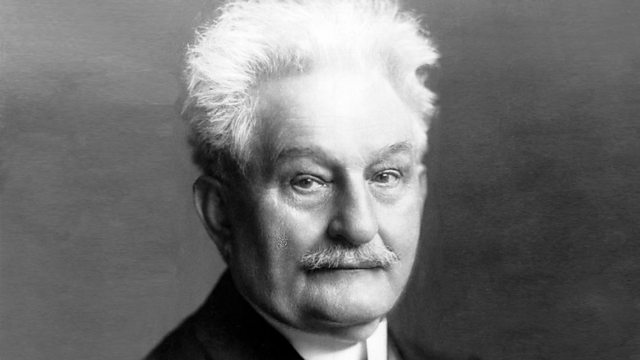
Dvořák, a mentor and a friend
Donald Macleod explores Jan├í─Źek's friendship with Dvo┼Ö├ík, with music from Jan├í─Źek's first opera, ┼á├írka and Sinfonietta.
Donald Macleod explores Jan├í─ŹekÔÇÖs friendship with Dvo┼Ö├ík, with music from Jan├í─ŹekÔÇÖs first opera ┼á├írka and Sinfonietta.
One of the most original voices of the twentieth century, Leo┼í Jan├í─Źek was a composer, musical theorist, folklorist and teacher. Born in 1854 in the Moravian village of Hukvaldy, which was then part of the Austrian Empire, in his youth German was the language of government, education and social influence. Having returned from studies in Germany, Jan├í─Źek made detailed studies of native folk song and spent years annotating the natural rhythms of the Czech language. He was to write all his works for stage in his native language. The range of his professional activities gave him a range of outlets to voice what quickly became a life-long commitment to Czech culture.
Jan├í─Źek was a contradictory man, who spent much of his life feeling at odds with his circumstances. Through five of his closest relationships, Donald Macleod builds a picture of how his inner tensions found expression in his music. The longest and most fractured of his associations was with his German speaking wife Zdenka. After a shaky start, he grew very close to his daughter Olga, with whom he shared his love of Russian literature. His friendship with the literary collaborator Max Brod proved to be the turning point in his quest for professional standing, while his muse Kamila St├Âsslova became the joy and agony of his later, creatively enriched years. As a young man Jan├í─Źek turned to Anton├şn Dvo┼Ö├ík. They shared an interest in folk music, and the older composer proved to be a loyal friend and mentor.
It was when Jan├í─Źek was in his twenties, studying in Prague around 1874, that he is thought to have first met Dvo┼Ö├ík. Their association was to last until the older composerÔÇÖs death in 1904.
Suite for Strings, Andante con moto (3rd mvt)
Janacek Chamber Orchestra
Four male-voice choruses
Ȯ lásko (O, love) JW IV/17
Ach, vojna! (Oh to be a soldier) JWIV/17
Moravian TeachersÔÇÖ Choir
Lubomir Mati, director
Lachian Dances
No 1: Starodavny (Old-Time Dance)
Slovak Radio Symphony Orchestra
Ondrej Lenárd, conductor
Šárka (excerpt from Act 1)
Peter Straka, tenor, Ctirad
Eva Urbanová, soprano, Šárka
Prague Philharmonic Chorus
Czech Philharmonic Orchestra
Charles Mackerras, conductor
Sinfonietta
Czech Philharmonic Orchestra
Karel An─Źerl, conductor
Last on
More episodes
Previous
You are at the first episode
Music Played
-
![]()
Leos Jan├í─Źek
Suite for strings (Andante con moto)
Orchestra: Jan├í─Źk┼»v Komorn├ş Orchestr.- CHANDOS : CHAN-10678.
- CHANDOS.
- 1.
-
![]()
Leos Jan├í─Źek
O lásko (O, love)
Choir: Moravian Teachers' Choir. Conductor: Lubom├şr M├ítl.- Naxos: 8553623.
- Naxos.
- 6.
-
![]()
Leos Jan├í─Źek
Ach, vojna! (Oh to be a soldier)
Choir: Moravian Teachers' Choir. Conductor: Lubom├şr M├ítl.- Naxos: 8553623.
- Naxos.
- 6.
-
![]()
Leos Jan├í─Źek
Lachian Dances, No 1
Performer: Slovak Radio Symphony Orchestra, Bratislava.- Naxos 8550411.
- Naxos 8550411.
- 1.
-
![]()
Leos Jan├í─Źek
Sarka: Act I (extract)
Singer: Peter Straka. Singer: Eva Urbanová. Choir: Prague Philharmonic Choir. Orchestra: Czech Philharmonic. Conductor: Charles Mackerras.- Supraphon SU 3485-2.
- Supraphon SU 3485-2.
- 4.
-
![]()
Leos Jan├í─Źek
Sinfonietta
Orchestra: Czech Philharmonic. Conductor: Karel An─Źerl.- FIDELIO : 1852.
- FIDELIO.
- 1.
Broadcast
- Mon 2 Dec 2019 12:00├█Đ┐┤ź├Ż Radio 3
Beethoven Unleashed ÔÇô the box set
What was really wrong with Beethoven?
Composers A to Z
Who knew? Five eye-opening stories from Composer of the Week
Five reasons why we love Parry's Jerusalem
What is the strange power of Jerusalem which makes strong men weep?
A man out of time ÔÇô why Parry's music and ideas were at odds with his image...
The composer of Jerusalem was very far from the conservative figure his image suggests.
Composer Help Page
Find resources and contacts for composers from within the classical music industry.





